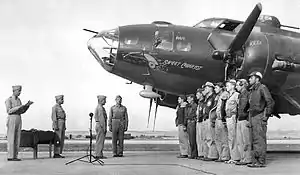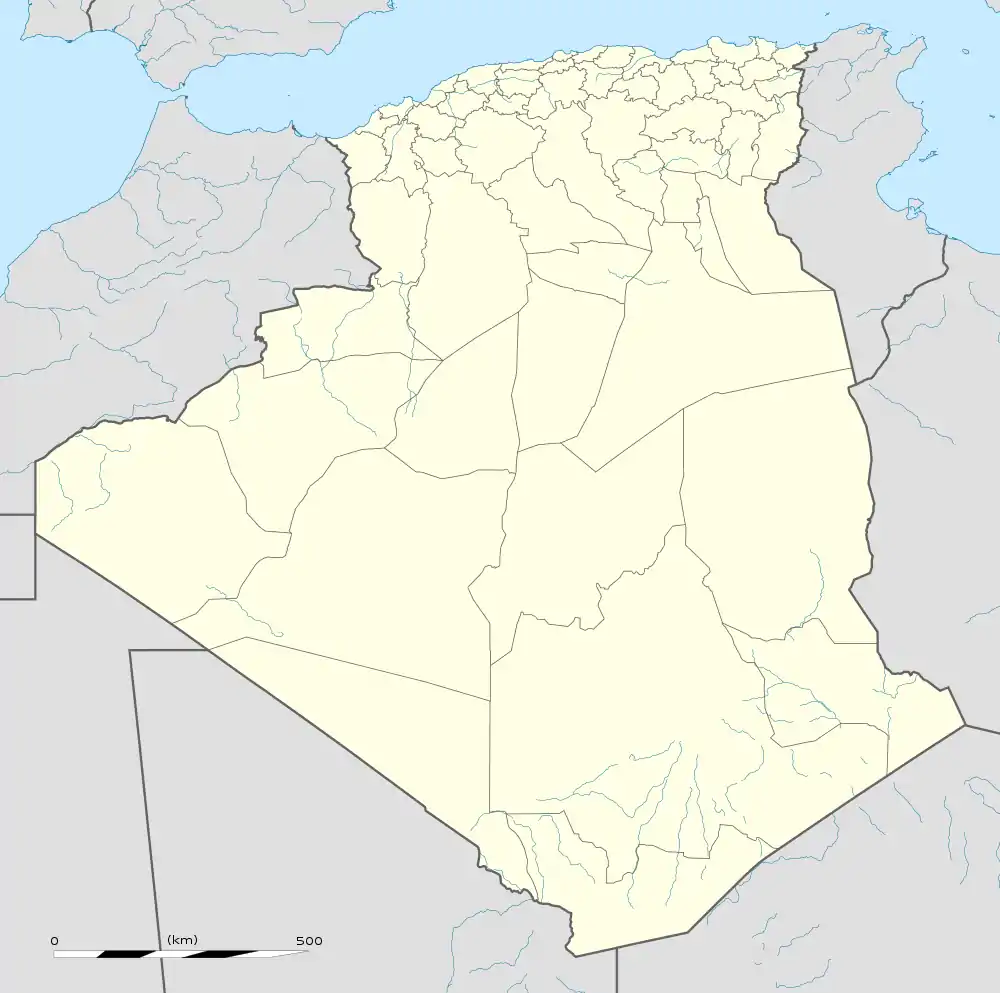Chateaudun-du-Rhumel Airfield
Chateaudun-du-Rhumel (Chateaudun Du Rhumel) Airfield is an abandoned military airfield in Algeria, located about 6 km north-northwest of Chelghoum el Aid, in Mila province, about 47 km southwest of Constantine.
Chateaudun-du-Rhumel Airfield.png.webp) | |
|---|---|
| Part of Twelfth Air Force | |
 Gen. Jimmy Doolittle awards the Purple Heart to the aircrew of Boeing B-17E Fortress 41-9021 ‘Sweet Chariot’ at Chateau-dun-du-Rhumel Airfield, Algeria, July 1943. | |
| Coordinates | 36°08′39″N 006°07′53″E |
| Type | Military Airfield |
| Site information | |
| Controlled by | United States Army Air Forces |
| Site history | |
| Built | 1942 |
| In use | 1942–1943 |

Overview
During World War II it was used by the United States Army Air Force Twelfth Air Force during the North African Campaign against the German Afrika Korps. The airfield was built by the United States Army Corps of Engineers, and its primary use was that of a heavy bomber airfield, with concrete runways, hardstands and taxiways. Billeting and support facilities consisted of tents. The 2d Bomb Group and the 97th Bomb Group were the primary tenants at the airfield, both flying B-17 Flying Fortresses missions over targets in Italy; Tunisia; Sicily and Sardinia. The 1st Fighter Group flew escort for the Fortresses, as well as attacking enemy ground targets of opportunity.
Known units assigned to the airfield were:
- HQ 5th Bombardment Wing, March– August 1943
- HQ 7th Fighter Wing (later 47th Bombardment Wing), 11 January – 1 March 1943
- 1st Fighter Group, ca. 16 Feb 43 - 29 Jun 43[1] Lockheed P-38 Lightning
- 2d Bombardment Group, 27 April – 7 June 1943,[2] B-17 Flying Fortress
- 97th Bombardment Group, 8 February – 1 August 1943,[3] B-17 Flying Fortress
- 37th Service Group, 12 Feb 43 - 12 Aug 43
- 26th, 49th Service Squadrons, 1033d Signal Company, 1070th Ordnance Company (Air Base), 1680th Ordnance Medium Maintenance Company
When the Americans moved out in late 1943, the airfield was dismantled and abandoned. Today, there is almost no evidence of its existence, as the land has returned to agricultural use. Faint outlines of dispersal pads, runways and taxiways can be seen in aerial photography, and there may be a number of agricultural buildings on a former concreted aircraft parking/maintenance area to the south of the field.
See also
- Boeing B-17 Flying Fortress airfields in the Mediterranean Theater of Operations
References
Notes
- Maurer, Maurer, ed. (1983) [1961]. Air Force Combat Units of World War II (PDF) (reprint ed.). Washington, DC: Office of Air Force History. p. 23. ISBN 0-912799-02-1. LCCN 61060979.
- Maurer, Combat Units, p. 27
- Maurer, Combat Units, p. 167
Bibliography
![]() This article incorporates public domain material from the Air Force Historical Research Agency website http://www.afhra.af.mil/.
This article incorporates public domain material from the Air Force Historical Research Agency website http://www.afhra.af.mil/.
- Maurer, Maurer, ed. (1983) [1961]. Air Force Combat Units of World War II (PDF) (reprint ed.). Washington, DC: Office of Air Force History. ISBN 0-912799-02-1. LCCN 61060979.
- Maurer, Maurer, ed. (1982) [1969]. Combat Squadrons of the Air Force, World War II (PDF) (reprint ed.). Washington, DC: Office of Air Force History. ISBN 0-405-12194-6. LCCN 70605402. OCLC 72556.
- USAFHRA search for Chateau-dun-du-Rhumel Airfield